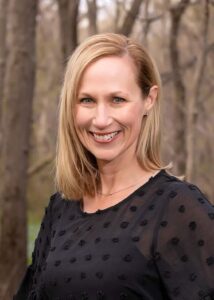Suzanne Bartlett Hackenmiller, MD, on the Healing Effects of Time in Nature
 Around 2007, as an OB-GYN practitioner with two young children—one of whom was diagnosed with autism—I began feeling burnt out. Then in 2008, my husband was diagnosed with stage 4 lung cancer. He was not a smoker, so we were caught completely off guard.
Around 2007, as an OB-GYN practitioner with two young children—one of whom was diagnosed with autism—I began feeling burnt out. Then in 2008, my husband was diagnosed with stage 4 lung cancer. He was not a smoker, so we were caught completely off guard.
That’s when I started asking a lot of questions about conventional medicine: What do we have to offer our patients? Is it only pharmaceutical meds and surgery? My conventional medicine background provided me with no satisfactory answers.
At the same time, I was receiving a lot of unsolicited advice concerning my special-needs child. Many of the suggestions about diets and therapies were alternative, even fringe, but I thought that perhaps there was some merit to them. Still, I was uncertain. I also had many questions about the increasingly high incidence of autism diagnoses. Was there something in the environment causing this? Was it something in the food? Something in the air or water? (Actually, this is what we now believe—that there is a genetic predisposition to autism that is triggered by something in the environment.) I also wanted to know how someone like my husband, who was not a smoker, gets stage 4 lung cancer.
In 2010 I attended a conference at which the keynote speaker was Dr. Andrew Weil, the founder and leading proponent of integrative medicine. It was a life-changing experience for me, and I realized that I needed to change the way I cared for my patients and my family. So, I applied for an integrative medicine fellowship at the University of Arizona. In 2012, my husband was in hospice, but he insisted that I start the fellowship. He attended the fellowship with me. Three weeks after we returned, my husband passed away. But the experience completely transformed the way I viewed the world around us, like our food and our environment, and gave me more tools with which to treat my patients.
After my husband’s death, I found that my healing came from being outdoors—the adventure of trail running, mountain biking, kayaking, all adrenaline-inspired. In 2014, I heard about forest bathing, and the idea of a contemplative practice that balances the adventure of being outdoors resonated deeply with me.
What Is Forest Bathing?
Forest bathing is rooted in the Japanese practice of shinrin-yoku, but it’s not a literal bath. Rather, the term refers simply to immersing one’s self in nature. Rather than being just a walk in the woods, it’s a conscious and contemplative practice of being attentive to the sights, sounds, and smells of the forest. Forest bathing is a slowed-down experience in nature, with no agenda. It’s not a hike or exercise. It’s done in quiet. We follow a standard sequence, taking people from their everyday state to a dreamlike or subliminal state. We find that it’s in this subconscious realm that healing takes place.
Doctors who originally described forest bathing in Japan found that people repeatedly reported improvements in all parameters of mental health after spending a quiet, sensory-filled time in nature. I have also used questionnaires of the kind used by researchers, and it’s almost uncanny how consistent the reported results are.
Studies of forest bathing found improvements in blood pressure, blood sugar, and heart rate variability. When doctors looked at salivary hormones for stress, they found that the level of hormones decreased after forest bathing. One study found that after people interacted with nature, their memory and attention span improved by 20%—regardless of whether or not the participant enjoyed the experience, which makes forest bathing perfect for children.
Research shows that plants’ essential oils, or phytoncides, that we absorb during forest bathing have antimicrobial properties that help our bodies fight infection from viruses and bacteria in the same way they help plants. They also contribute to the response of our natural killer cells, which prevents cells from dividing abnormally and becoming tumor cells. So, to find that spending time in nature reduces your risk of cancer while stimulating your immune system is pretty monumental.
So, how much time do you need to spend outdoors to achieve optimal health benefits? Research suggests that about 20 minutes per day outdoors, slowing down to simply breathe deeply and focus on the sensory experience is all it takes. And it’s completely free, making it one of the best prescriptions for mental health.
Dr. Suzanne Bartlett Hackenmiller is an OB-GYN and Integrative Medicine physician, the author of The Outdoor Adventurer’s Guide to Forest Bathing, Lead Medical Advisor for AllTrails and a Diplomate of the American Board of Integrative Medicine (ABOIM), a Member Board of the American Board of Physician Specialties® (ABPS).






